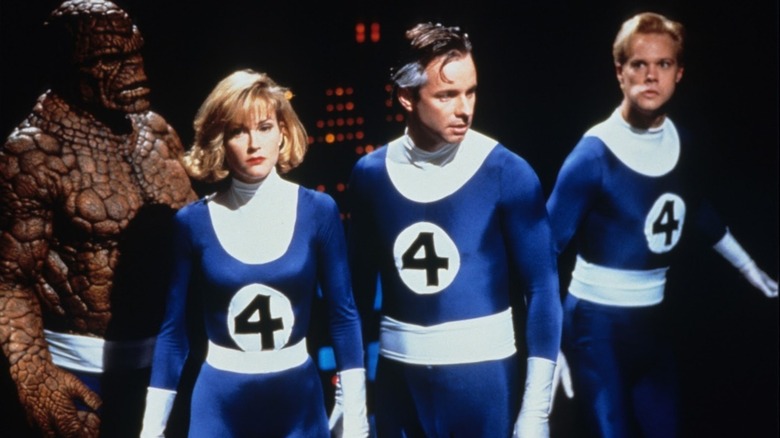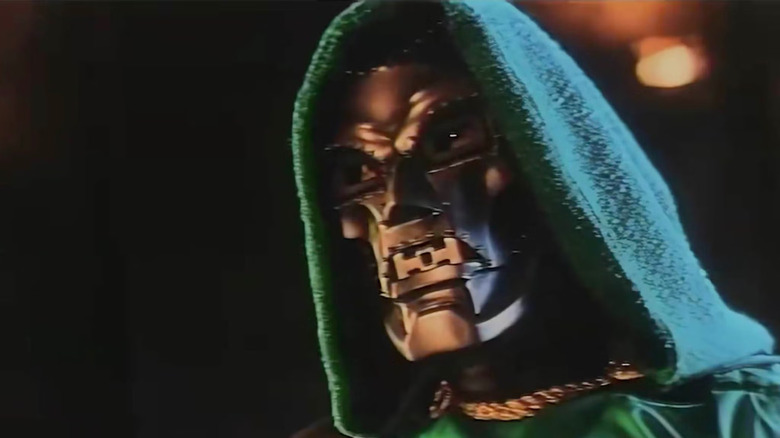The Original Fantastic Four Stars Spent Their Own Cash To Promote The Roger Corman Marvel Film
In the analog, pre-internet age of the 1980s, hardcore genre fans eager to learn the latest about films in development had to rely on snippets from magazines like Starlog, Fangoria, and Cinefantastique. It was in the pages of these publications that we tracked the progress (or lack thereof) of "Star Wars," "Star Trek," and myriad superhero movies. Aside from a couple of "Swamp Thing" flicks and the diminishing returns of the Christopher Reeve-led "Superman" movies, these years were a desert for comic book fans. Rumored big-screen adaptations of "Batman," "Spider-Man" and "Captain America" kept going nowhere. Then the dam broke. Tim Burton's "Batman" became the top grossing film of 1989, at which point studios began kicking the tires on everything comic book-related.
This was the moment German producer Brand Eichinger had been waiting for since 1986, when he optioned the "Fantastic Four" film rights for $250,000. Perhaps now studios like Columbia and Warner Bros. Pictures, which had previously balked at the budget for a movie based on Stan Lee and Jack Kirby's beloved quartet, would leap at the opportunity to get in the comic book game.
This did not come to pass.
In 1992, Eichinger, on the verge of losing his option, desperately rushed a "Fantastic Four" movie into production in order to maintain control of the property. He struck a deal with Roger Corman's New Horizon Pictures to finance the $1 million production, a film that, unbeknownst to the director (Oley Sassone) and his cast, was never meant to be released. Had they known this, they might've backed off spending their own money to promote the movie all over the United States.
The Corman-produced Fantastic Four was built to fail
In a featurette included on the home media release of Marvel Studios' well-reviewed "The Fantastic Four: First Steps," the actors from the unreleased 1994 movie discuss how they believed in the film's scrappy potential enough to finance their own publicity campaign. According to Michael Bailey-Smith (who gave a genuinely lovely performance as Ben Grimm):
"After the trailer played at the Shrine Auditorium, Alex [Hyde-White] looks at me and he says, 'Michael, we gotta do something ...' and I go, 'What do we do?' He goes, 'We gotta hire a publicist, and I know somebody.' And so I end up paying for the publicist about $15,000 out of my own pocket. And we went around the country promoting this."
Hyde-White, who played Reed Richards, strategized a tour of Comic Cons where the movie's cast would hang out and sign pictures. They were picking up a bit of momentum. The magazine Film Threat gave them the cover and championed the movie as an underdog, low-budget superhero flick with a load of heart. We knew it would look cheap, but everyone seemed committed to giving fans, at the very least, an inventive, community theater version of "The Fantastic Four."
Unfortunately, the rights got sold. Eichinger, eying a big payday down the road (which he'd find with 20th Century Fox's wretched "Fantastic Four" in 2005), ordered the destruction of every film print. The let's-put-on-a-superhero-movie campaign ground to a halt, but you can still find the Sassone-directed film in bootleg form. It's a charmer, and, in my estimation, more satisfying than every other take on these characters to date.

